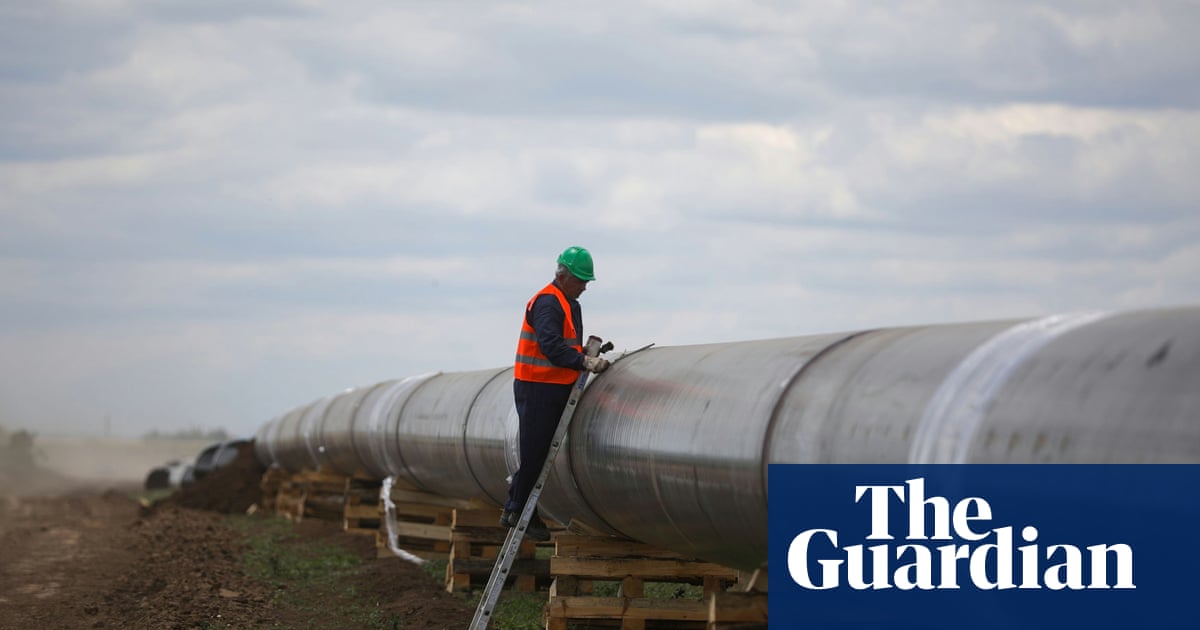EU spends more on Russian oil and gas than financial aid to Ukraine – report

The EU is spending more money on Russian fossil fuels than on financial aid to Ukraine, a report marking the third anniversary of the invasion has found.
The EU bought €21.9bn (£18.1bn) of Russian oil and gas in the third year of the war, according to estimates from the Centre for Research on Energy and Clean Air (Crea), despite the efforts under way to kick the continent’s addiction to the fuels that fund Vladimir Putin’s war chest.
The amount is one-sixth greater than the €18.7bn the EU allocated to Ukraine in financial aid in 2024, according to a tracker from the Kiel Institute for the World Economy (IfW Kiel).
Vaibhav Raghunandan, an analyst at Crea and coauthor of the report, said: “Purchasing Russian fossil fuels is, quite plainly, akin to sending financial aid to the Kremlin and enabling its invasion. [It’s] a practice that must stop immediately to secure not just Ukraine’s future, but also Europe’s energy security.”
The researchers compiled trade data to estimate the value of Russian fuels that were sold around the world in the third year of the invasion. They forecast data for February 2025, which is not yet available, based on imports in January.
In the calendar year 2024, the EU spent 39% more on Russian fossil fuel imports than it set aside for Ukraine. The aid figure does not include military or humanitarian contributions.
Christoph Trebesch, an economist at IfW Kiel, which was not involved in the analysis, said there was a striking gap between how much aid donors had mobilised for Ukraine compared with past wars, with European donors spending on average less than 0.1% of GDP a year.
He said: “Many countries were more generous in past conflicts. Germany, for example, mobilised much more aid, more quickly for Kuwait’s liberation in 1990/91 than it has for Ukraine in a comparable time period.”
The report also found Russia earned €242bn from global fossil fuel exports in the third year of its full-scale invasion of Ukraine, with revenues since the start of the war “now inching closer to the trillion figure” as the country adapts to sanctions.
Russia gets up to half of its tax revenues from the oil and gas sector and has sought to bypass sanctions by moving fuels on a “shadow fleet” of old and underinsured tankers. The obscure ships are responsible for transporting about one-third of its fossil fuel export revenues, according to Crea.
On Wednesday, EU ambassadors agreed on new measures to target Russia’s shadow fleet in the 16th round of sanctions since the war began.
The Crea researchers estimated Russian fossil fuel revenues could fall 20% by beefing up existing sanctions and plugging gaps. The measures include closing a “refining loophole” through which Europe can buy Russian crude that has been processed in another country, and restricting gas flows through the Turkstream pipeline.
The report also called for a crackdown on liquefied natural gas (LNG). Europe has slashed its imports of piped Russian gas since the start of the Ukraine war but has sated some of its hunger for energy with shipments of super-chilled gas, including from Russia.
Jan-Eric Fähnrich, a gas analyst at Rystad Energy, said the role of LNG in the EU and UK has grown dramatically since the start of the war, shooting up from a prewar high of 81.3mt in 2019 to 119mt in 2022. He said: “Russia captured the spot as No 2 LNG exporter to Europe last year.”
Related
A New Book Argues That What Happens in Europe Doesn’t…
Remaking the World: European Distinctiveness and the Transformation of Politics, Culture, and the Economy by Jerrold Seigel “No issue in world
Poland plans military training for every adult male amid growing…
Poland’s prime minister, Donald Tusk, has said his government is working on a plan to prepare large-scale military training for every adult male in response t
2025 European Athletics Indoor Championships: Ditaji Kambundji secures women’s 60m…
Switzerland’s Ditaji Kambundji walked away from the 2025 European Athletics Indoor Championships in Apeldoorn on 7 March with much more than her first Europea
Takeaways from the EU’s landmark security summit after Trump said…
BRUSSELS (AP) — European Union leaders are trumpeting their endorsement of a plan to free up hundreds of billions of








